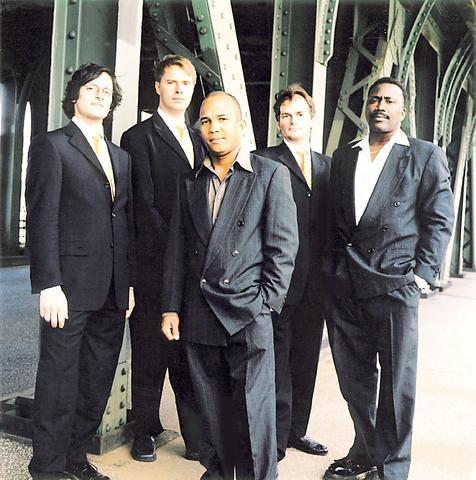Coming hot on the heels of the Taichung Jazz Festival, which ended only last weekend, the city will play host to yet another jazz event, this time a one-off, but no less anticipated for the talent sweeping through town.
The concert tomorrow, called Classic Meets Cuban, is a union of the Klazz Brothers from Germany and two outstanding jazz percussionists from Cuba. As a marriage of styles, the Klazz Brothers bring a longstanding reputation for their work in classical music for the Dresden Philharmonic Orchestra, while Alexis Herrera Estevez and Elio Rodriguez Luis add the diversity of styles for which their native Cuba is so well known.

PHOTO COURTESY OF ARTISTS
The ensemble has gained its acclaim since its founding a few years ago for Cuban jazz-inspired reworkings of classical pieces by Mozart, Beethoven, Brahms, Schubert, Bach, Bizet and other masters.
It may sound like a clash of styles, especially when conceptualizing Mozart's Symphony No. 40 in Latin form with the blatantly latinized title Mambozart, but the results are surprisingly pleasant. For one, the Cuban element dominates and brings a level of energy that lovers of the original pieces will be unaccustomed to hearing.
Underpinning each song is the strength of the Klazz Brothers, who are made up of Kilian and Tobias Forster and Tim Hahn. The solid classical formations of these three are evident in the easy manner in which the latin fusions sound improvised -- as if recorded on a Havana sidewalk. It's not just anyone, after all, who can turn Beethoven's Fur Elise into a riling salsa number, or Chopin's Tristesse Etude into a sexually super-charged rumba.
For that kind of originality, the music relies heavily on the Cuban percussion provided by some of the strongest talents from that country. Estevez has been a member of Cuba's premier Latin Jazz group, the Havana Ensemble, since 1997 and has cooperated with Compay Segundo of the Buena Vista Social Club along with other Cuban jazz masters. He is the timbalist in the Classic Meets Cuban lineup. Luis is the band's conga player and, like Estevez, has been a part of the Havana Ensemble since 1997.
All the tinkering with classical masterpieces could make the Klazz Brothers and Cuban Percussion group either hopeless apostates or radical luminaries of musical and cultural interaction. That depends on how sacrosanct one views classical masterpieces to be. But most importantly, the energy of the band is genuine and the joining of styles comes across as complementary instead of grating or specious, as it does in other fusion experiments such as Bond or China's 12 Girls Band.
The band will be swinging their way to Taiwan on a quick leg of an Asian tour for one show that should provide a nice bookend to Taichung's short jazz season.
The Classic Meets Cuban is tomorrow at Taichung Chungshan Hall, 98 Hsuehshih Rd, Taichung (台中市學士路98號). Tickets are NT$300 to NT$2,500, available through Era ticketing outlets or at www.ticket.com.tw.

May 11 to May 18 The original Taichung Railway Station was long thought to have been completely razed. Opening on May 15, 1905, the one-story wooden structure soon outgrew its purpose and was replaced in 1917 by a grandiose, Western-style station. During construction on the third-generation station in 2017, workers discovered the service pit for the original station’s locomotive depot. A year later, a small wooden building on site was determined by historians to be the first stationmaster’s office, built around 1908. With these findings, the Taichung Railway Station Cultural Park now boasts that it has

Wooden houses wedged between concrete, crumbling brick facades with roofs gaping to the sky, and tiled art deco buildings down narrow alleyways: Taichung Central District’s (中區) aging architecture reveals both the allure and reality of the old downtown. From Indigenous settlement to capital under Qing Dynasty rule through to Japanese colonization, Taichung’s Central District holds a long and layered history. The bygone beauty of its streets once earned it the nickname “Little Kyoto.” Since the late eighties, however, the shifting of economic and government centers westward signaled a gradual decline in the area’s evolving fortunes. With the regeneration of the once

The latest Formosa poll released at the end of last month shows confidence in President William Lai (賴清德) plunged 8.1 percent, while satisfaction with the Lai administration fared worse with a drop of 8.5 percent. Those lacking confidence in Lai jumped by 6 percent and dissatisfaction in his administration spiked up 6.7 percent. Confidence in Lai is still strong at 48.6 percent, compared to 43 percent lacking confidence — but this is his worst result overall since he took office. For the first time, dissatisfaction with his administration surpassed satisfaction, 47.3 to 47.1 percent. Though statistically a tie, for most

In February of this year the Taipei Times reported on the visit of Lienchiang County Commissioner Wang Chung-ming (王忠銘) of the Chinese Nationalist Party (KMT) and a delegation to a lantern festival in Fuzhou’s Mawei District in Fujian Province. “Today, Mawei and Matsu jointly marked the lantern festival,” Wang was quoted as saying, adding that both sides “being of one people,” is a cause for joy. Wang was passing around a common claim of officials of the People’s Republic of China (PRC) and the PRC’s allies and supporters in Taiwan — KMT and the Taiwan People’s Party — and elsewhere: Taiwan and